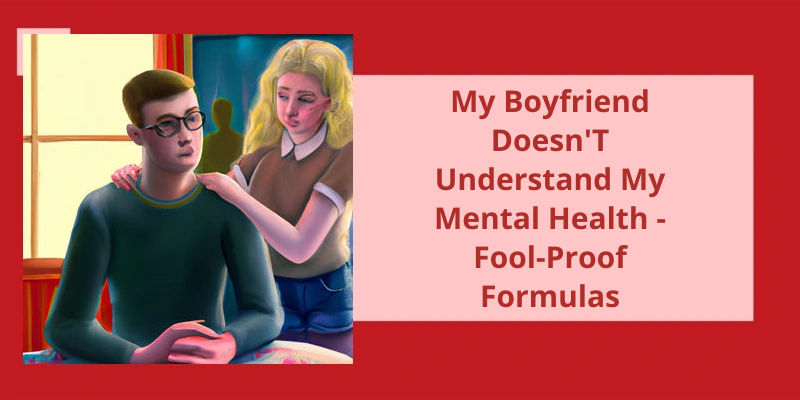Relationships can be a wonderful source of happiness and support, but they can also present challenges when it comes to understanding and navigating the complexities of mental health. For individuals who struggle with mental health issues, such as anxiety, depression, or other conditions, it can be frustrating and isolating when their partners don’t fully comprehend or appreciate their experiences. This can lead to emotional distance, misunderstandings, and a lack of empathy that can strain the relationship. By doing so, you can foster a stronger, more compassionate bond that will enable both of you to navigate the obstacles together and create a supportive environment for your mental well-being.
What Do You Do When Your Partner Doesn T Understand Your Mental Illness?
When faced with the challenge of a partner who doesn’t understand your mental health, it can be incredibly frustrating and isolating. It’s important to remember that you aren’t alone in this struggle, and there are steps you can take to try and bridge the gap in understanding. Communication is key in any relationship, especially when it comes to discussing mental health.
One helpful strategy is to prepare ahead of time for conversations about your mental illness. It might be helpful to write down your thoughts and feelings beforehand, so that you can easily communicate them in the moment. This can also help you stay focused and articulate your needs clearly.
In addition to preparing, it’s important to use resources to speak clearly about your mental health. This could mean sharing educational materials or articles with your partner to help them better understand what youre going through. It can also be helpful to involve a mental health professional, such as a therapist or psychiatrist, who can provide them with more information and guidance.
When trying to explain your anxiety to your partner, it can be useful to describe your feelings in specific situations. It’s important to give concrete examples of how anxiety manifests for you, rather than relying on vague descriptions. This can help your partner gain a better understanding of what you go through on a daily basis.
Another step you can take is to explain your triggers to your partner. Help them understand what situations or stimuli cause your anxiety to worsen. By sharing this information, they can be more mindful and supportive in helping you navigate those triggers.
Additionally, it can be beneficial to let your partner know what makes you feel better when youre experiencing anxiety. Whether it’s engaging in certain activities, practicing self-care, or seeking support, communicate these strategies to them so that they can actively assist you during difficult moments.
Lastly, it’s crucial to have an open and honest conversation about how your partner can best support you. Let them know what they can do to help when youre struggling, whether it’s offering a listening ear, giving you space, or researching additional resources. By having these discussions, you can work together to find ways to support each other and strengthen your relationship.
Seeking Professional Help Together: Consider Going to Therapy or Couples Counseling to Address the Issues Surrounding Your Mental Illness and It’s Impact on Your Relationship. A Mental Health Professional Can Help Facilitate Communication and Offer Guidance on How to Support Each Other Better.
One effective way to address the challenges caused by your mental health within your relationship is to seek professional help together. By going to therapy or couples counseling, you can receive guidance and support from a mental health professional. This can lead to better communication and understanding between you and your boyfriend, as well as provide tools for supporting each other more effectively.
These symptoms can significantly impact our relationships, as they can hinder effective communication, emotional connection, and overall relationship satisfaction.” It’s crucial to understand the connection between mental health and relationships to foster a supportive and healthy partnership.
Can Your Mental Health Mess With Your Relationship?
These symptoms can surely have an impact on your relationship dynamic. Your boyfriend may struggle to understand and empathize with your mental health challenges, especially if he’s never experienced them himself. It can be frustrating when your partner doesn’t fully comprehend what youre going through, leading to feelings of isolation and disappointment.
Communication is crucial in situations like these. Honest and open conversations about your mental health can help your boyfriend gain a better understanding of your experiences. Be patient and explain how your symptoms affect you and your relationship. This will allow him to develop a deeper empathy towards your struggles.
Sometimes, it may be helpful to involve a professional. Seeking therapy together can provide a safe space for both of you to express your feelings and concerns. A therapist can also offer guidance on how to navigate your mental health challenges within your relationship.
It’s essential for your boyfriend to educate himself on mental health and the specific illness you’re facing. Encourage him to read articles, books, or attend support groups. This will help him gain insight and provide a solid foundation for empathy and understanding.
Both of you need to be actively engaged in this process. At the same time, it’s important for you to maintain self-care practices and seek support from other sources, such as friends or a support group. This will ensure that you’ve a solid network of understanding and empathy around you.
Lastly, remember that everyones journey is unique, and individuals may need different amounts of time and effort to comprehend mental health challenges. Be patient with your partner, and celebrate small victories when there’s progress in understanding and support.
The Impact of Mental Health on Romantic Relationships.
Mental health can have a significant impact on romantic relationships. When one partner experiences mental health issues, such as anxiety or depression, it can create challenges and strain within the relationship. The person with mental health struggles may find it difficult to communicate their needs and emotions, leading to misunderstandings and frustration. The partner who doesn’t understand may feel confused or helpless, unsure of how to support their loved one. It’s important for both individuals to have open and honest conversations about mental health, fostering understanding and empathy. Seeking professional help, such as couples therapy, can provide valuable tools and strategies to navigate these challenges together. By educating themselves and showing unconditional support, partners can build a strong foundation of love and compassion, fostering a healthy and understanding relationship.
Conclusion
It requires open communication, empathy, and a willingness to educate oneself on the intricacies of mental health disorders. While fool-proof formulas may not exist, there are valuable approaches to fostering understanding and support. Encouraging open dialogue, seeking professional guidance, and practicing self-care are all important aspects of maintaining a healthy relationship while managing mental health challenges. Ultimately, it’s crucial for both partners to approach the situation with patience, compassion, and a genuine desire to learn and grow together. By fostering an environment of empathy and understanding, it’s possible to bridge the gap and find a collective path towards healing and support.






